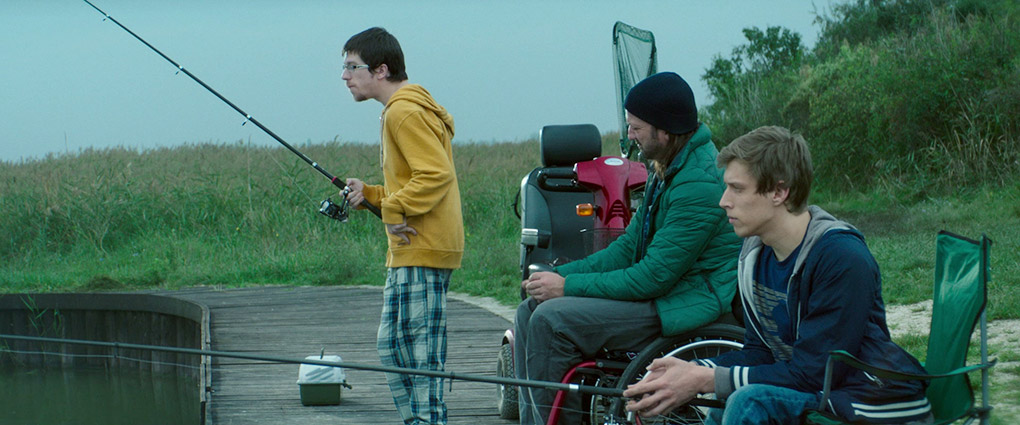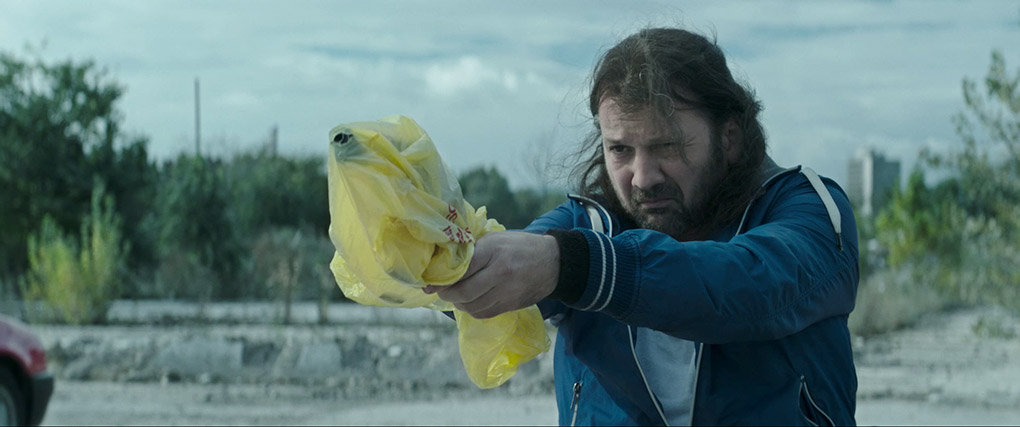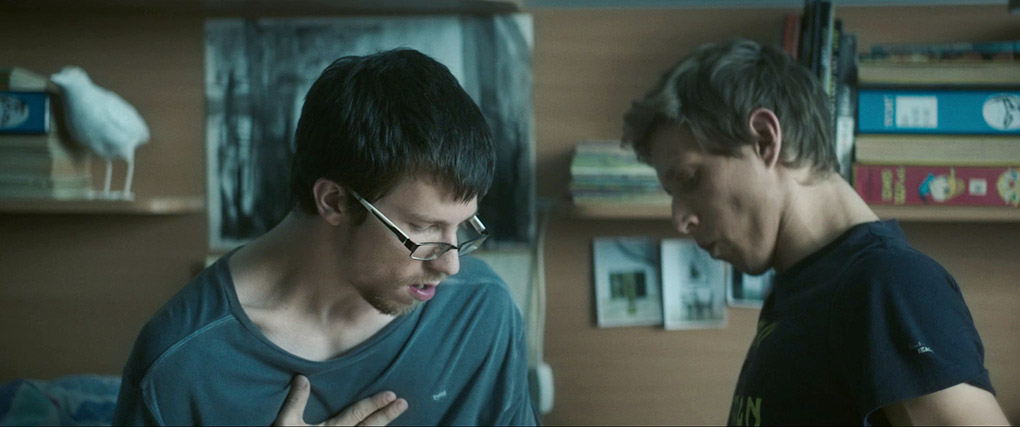|
Some years ago, when I first saw Henry Alex Rubin and Dana Adam Shapiro’s documentary about quadriplegic full-contact rugby players, Murderball, I remember being struck by a story told by one of the film’s handicapped participants about how he brought an able-bodied man to the ground and was able to hold him there because of the upper-body strength he had developed from being in a wheelchair for so many years. It’s a point vividly seconded early on in Attila Till’s intriguingly titled Kills on Wheels, when in the course of doing chin-ups, disabled prisoner Rupaszov lifts both himself and his wheelchair up to the crossbar. It’s a memorable image and doubtless deliberately so, as later we will be asked to recall this moment when Rupaszov has to call on that very same muscular strength to get him out of a potentially lethal situation. But I’m getting ahead of myself.
The basic concept of Kills on Wheels is unfussily laid out in the title, but probably requires a little fleshing out. Ex-fireman Rupaszov (Szabolcs Thuróczy), who was paralysed from the waist down when the floor of a burning building in which he was working collapsed, is released from a spell in prison and now starts making money by doing contract work for Serbian gangster Rados (Dusán Vitanovics). A confrontational chance meeting hooks him up with the younger Zolika and Barba (played by newcomers Zoltán Fenyvesi and Ádám Fekete, whose very real disabilities are exactly as portrayed on screen), room-mates in a care facility who try to stave off despondency and despair by drawing a comic book based directly on their lives. When they accompany Rupaszov on one of his jobs for Rados, the fact that it proves to be an assassination doesn’t appear to faze them, and he thus allows them to assist on his subsequent hits, something that doesn’t go down well with Rados.

As a concept, this may have a fanciful ring, but has at its core an intriguing proposal, that Rados employs Rupaszov because he believes that few would suspect someone in a wheelchair of being an assassin, which both acknowledges and cannily exploits a stereotypical view of the disabled. This is perfectly illustrated by Rupaszov’s second hit, which is carried out in a busy Budapest public square with a silenced pistol – immediately after the shooting, the victim’s bodyguards are looking up at the windows of nearby buildings to locate the source of the shot, and not at the bedraggled man feeding pigeons from a wheelchair nearby.
What prevents Kills on Wheels being pigeonholed as a novelty crime drama is that it also takes time to explore the life experience of its genuinely disabled young co-stars through their characters. Zoli in particular is facing an uncertain future, having a severe and potentially fatal spinal problem that requires an operation to alleviate, one that he nor his mother can afford and that he refuses to let his financially secure but long-estranged father pay for. And in a scene that adds little to the story development, the three men hook up with a trio of cheery nurses for a night of drinking and dancing in Rupaszov’s apartment, allowing for some discussion on romantic relationships and sex from a disabled perspective.
While their disabilities do give the trio an edge when it comes to catching their would-be victims by surprise, the film also doesn’t shy away from the frustrations that being wheelchair-bound can bring. This is vividly illustrated when Rupaszov flees the scene of a shootout and struggles to make his way up a steep ramp and then finds his escape blocked by gates that he is unable to haul himself over. At one point, Till even simultaneously milks the characters’ disabilities for both comedy and tension, as when Zoli is ordered by Rupaszov get out of his car and and distract the approaching police, and is then forced to wait in agonisingly real time for him to slowly assemble his wheelchair before he can so. Fekete, meanwhile, seems happy to intermittently play his cerebral palsy for laughs, as in the almost throwaway moment when his physical instability causes him to press the wrong button on a vending machine and end up with a snack instead of sparkling water. There’s even a brief sight gag when he is spying on a target and his point-of-view shakily reflects his unsuccessful attempt to steady his binoculars.

A trio of fine performances and the fact that the odds are theoretically so stacked against them on every job makes it disarmingly easy to bond with the three leads. For a first-timer, Fenyvesi is particularly impressive, having previously made his name on the web under the moniker Wheelchairguy, and more than once I caught myself chewing my fingernails for raggedy Rupaszov’s safety. The supporting cast is also notable, from the disabled extras who give the care home scenes a sometimes documentary feel to the parade of terrifying thugs that Rupaszov has to face down. Back when I reviewed Nimród Antal’s Kontroll back in 2005 I saluted modern Eastern European cinema for casting people who really looked like the characters they played, and that statement still stands today.
There’s a twist in the tale that many will see coming, in part because it’s so frequently if creatively telegraphed, but to me it made sense of what had gone before and didn’t feel like the cheat that some have taken it as. The closing image deliberately echoes the one that opens the film, but is infused with so much more meaning, and for me brings this smart, engaging and slyly progressive comedy-drama to a touching and quietly satisfying conclusion.
The Blu-ray in this dual format set from Eureka’s Montage Pictures label sports a handsome 2.35:1 HD transfer, one whose crisp detail, well-balanced contrast and largely naturalistic colour are all impressively rendered. When brighter colours make an appearance, as in the nightclub sequence and the comic book colouring, they are vividly reproduced, and the image is spotless and free of any obvious enhancement. Very nice.

When it comes to the soundtrack, you can choose between Linear PCM 2.0 stereo and DTS-HD Master Audio 5.1 surround, both in the original Hungarian. The stereo track offers a clear and clean mix, but the DTS-HD track is definitely superior, and wipes the floor with the stereo in the aforementioned nightclub sequence, where the music has so much more breadth, bass and volume that if you have the sound turned up as loud as I did, you’ll probably be checking your windows and glassware for cracks.
The optional English subtitles are always clear. None of the Serbian dialogue (there’s not much of it) is translated, and this is clearly a deliberate move to align us with the Hungarian-speaking lead characters.
Only a Trailer (2:00), which ups the pace of the film and highlights the action. There are a couple of small potential spoilers, but they shoot past so quickly you’re unlikely to recognise them as such.
A brief plot summary alone was enough to get me in front of Kills on Wheels, but the film itself proved to be much more than the quirky comedy-drama it’s being pushed as. In some ways, it’s a shame that Eureka are releasing this on the Montage pictures label with no substantial extras, as some background information on the director and especially the lead actors would be welcome – Zoltán Fenyvesi’s Instagram fame alone could be the jumping-off point for an informative featurette. That said, the transfer and the DTS-HD soundtrack are both terrific, so if it’s just the film you’re after then you’ll have no complaints.
|